How Long Does Fl Studio Take To Learn
When I first got into electronic music production, I had no idea what to do.
I didn't know what I was supposed to learn or what I should focus my time on.
What I wish I had during this time was a basic design – a roadmap of what it takes to go from complete beginner to competent artist.
This article is that roadmap. If you follow the outline and recommendations in this mail service, I truly believe you lot can shave months if not years off the time it takes to become from beginner to expert.
As you lot journey through your life as a producer, you'll progress through 5 stages:
- Initiation
- Exponential Learning
- The Dip
- Proficiency
- Mastery
Some of yous might be at phase i—you're new to product and have no idea what you should exist doing. You lot might be at phase 3 struggling with creative problems.
Whatever stage you're at, at that place are key things you should be focusing on and thinking nearly.
If you lot are in the beginner stages, I've put together a free video training on how to crush information technology as a new producer. It will help you avoid the common mistakes that new producers brand, and give y'all a roadmap for getting started. 👇
New to music production?
Watch our gratis masterclass on how to learn electronic music production the smart way (without months of confusion & frustration)
Phase 1: Initiation
Time: 2-4 months
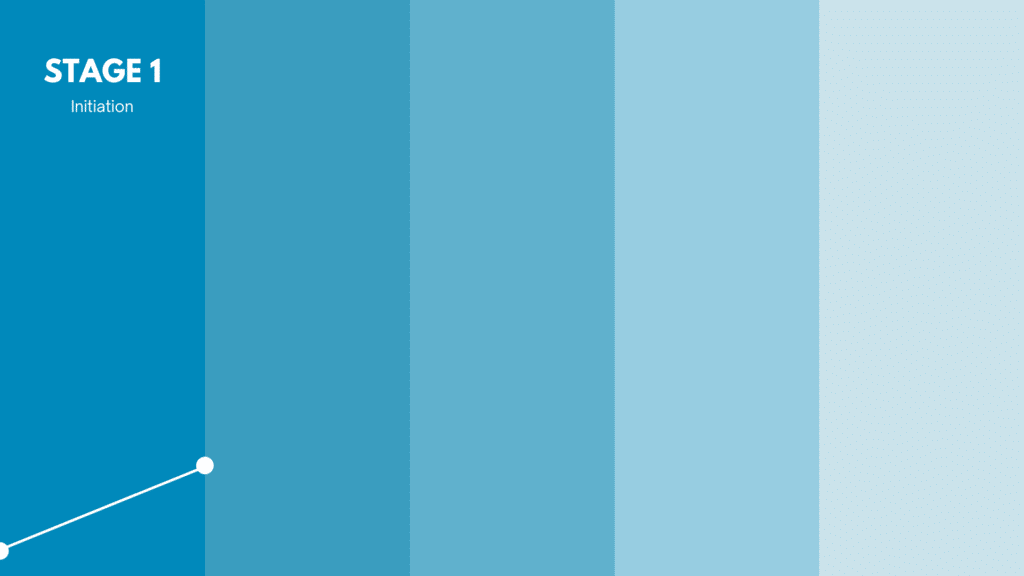
For most people, this first stage is one of excitement. Y'all've (hopefully) learned that it doesn't have one-half-a-1000000 dollars worth of gear to make electronic music, and you're eager to get started and put a runway together.
Amidst this excitement, there's a desperate urge for answers to what should be basic questions. What software should I utilise? Do I need to buy any special gear? What should I learn outset?
The way I look at information technology, for the first few months, at that place are three things you should focus on…
Recommended: What Really Is EDM?
one. Cull & acquire your DAW
In order to produce electronic music on a estimator, y'all'll need a Digital Audio Workstation, or DAW. A DAW is a software application used for producing, editing, and recording music.
If you're at this phase, yous probably already know the names of sure software, particularly the popular ones like Ableton Live , FL Studio , Cubase , Pro Tools , and Logic Pro .

The question is, which 1 should you lot pick?
There are a few things y'all take to realize if yous're in this position:
- At that place is no "objectively" best DAW. It comes down to preference. All mainstream DAWs take the capacity to output great music.
- The time you spend stressing over which DAW to pick could exist better spent learning production .
- You can always switch DAWs after on if yous feel the need to.
While I don't recommend stressing over the decision, information technology is a proficient thought to take some things into account when choosing a DAW, namely:
- What exercise your friends apply? If y'all have friends who make music, it'south a skillful idea to cull the aforementioned DAW as them so that you tin learn from them as all-time every bit possible.
- What's your budget? All mainstream DAWs price money. You're going to have to invest in one. Even so, they're not priced equally. If you're on a tight budget (under $200), y'all might consider Reaper, or the cheaper versions of FL Studio, Ableton Live, and Presonus Studio One. If y'all can beget to drib a couple hundred dollars, FL Studio Signature Bundle, Logic Pro Ten, and Ableton Live Standard are all expert choices.
- Educational Discounts: Most DAWs offer educational discounts for students. This includes Ableton Live, FL Studio, Bitwig, Reaper, and more.
- Our recommendation: We recommend choosing either Ableton Alive Standard or FL Studio Signature. Both are extremely powerful and capable programs and tin can be picked up relatively speedily. Since they are the nigh pop DAWs, most of the courses, tutorials, and books didactics music production use these programs. If money is tight, you tin can start with the limited versions of these software packages , and upgrade in the future. Both of them as well include 30 twenty-four hour period free trials to examination out the software.
For more caption as to why we recommend Ableton, check out this commodity on the best DAW for beginners.
The all-time communication I can give you is to just pick 1 and start working with it. It shouldn't have you longer than a day to choose a DAW.
Simply download one and go started (yous'll thank yourself later).
Do I need whatsoever other gear?
The question a lot of people enquire during the initiation stage is whether they need to buy anything more than a DAW.

At that place are ii answers to this: the true answer, and the common answer.
The truthful answer is that all you lot really demand is a DAW and a pair of headphones. Other pieces of gear can help just are by no means necessary. I like to call this the "Minimum Feasible Studio" (which is all youreallyneed to get started).
The mutual respond is that you demand at to the lowest degree a decent pair of headphones and maybe a MIDI keyboard. A decent pair of headphones should invariably exist the next item on your list if you find that making electronic music is something y'all want to keep doing.
If you exercise want to buy some gear and y'all're not certain what to pick, I recommend reading this article I wrote called Starting Electronic Music Production on a Budget.
Further reading:
- The Definitive Guide to Music Product Software
- The Best DAW for Beginners
- The Beginner'due south Guide to FL Studio
- Ableton vs. FL Studio: How to Pick the Right DAW for Yous
- Home Recording Studio: What You lot Really Need as a Producer
Learning your DAW
Having downloaded a DAW (or trial version of 1), you may feel tempted to get stuck in straight away and start making a song.
Doing this volition result in defoliation, frustration, and if you're non conscientious, y'all may determine that making electronic music is simply too hard so y'all'll give up.
Your number one priority subsequently downloading a DAW is to learn how to use it. The best style to practice this is to read your DAW's manual. If y'all're not much of a reader, search YouTube for [DAW Proper name] beginner's tutorial or How to use [DAW Proper name].
Using Ableton Live? Click the button below for gratuitous access to our twoscore-minute Ableton Beginner's Masterclass
Get instant admission to our free Ableton Live Masterclass
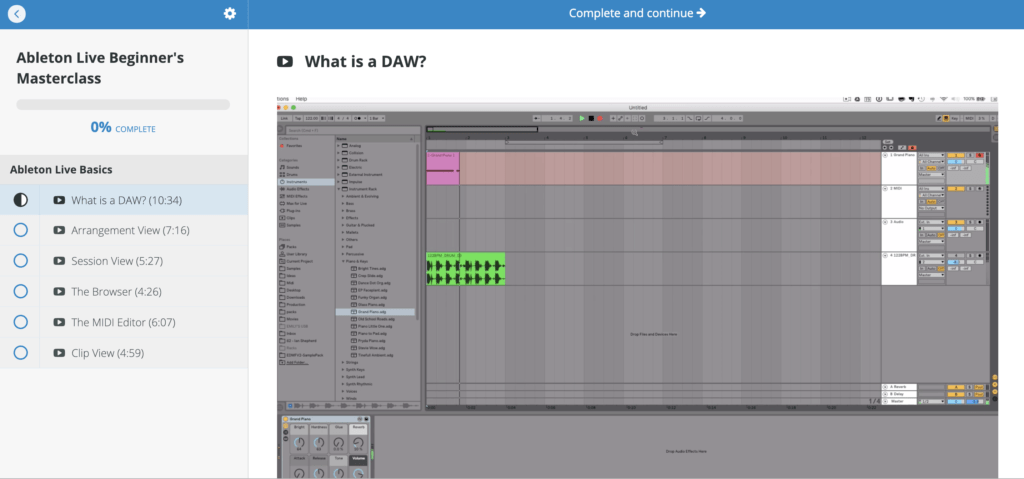
2. Experiment (Play)
After getting acquainted with your DAW, the next central matter you should exist doing is experimenting, or "playing."
The only objective here is to have fun. Certain, watch a few YouTube tutorials, larn a few things, but to a higher place all, experiment. Acquire how to put down a bones pulsate beat out. Try recreating the melody from whatever song is stuck in your head.
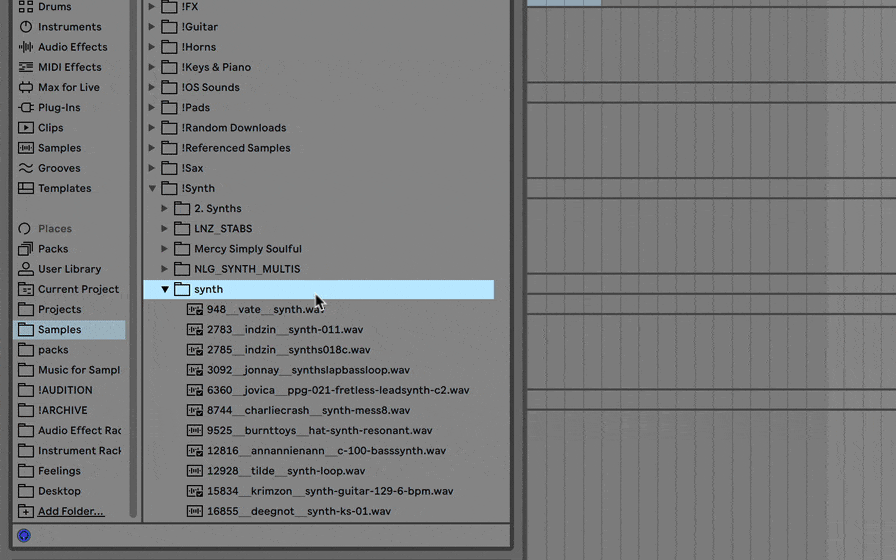
Practise this for a couple of weeks.
Some helpful tips for inspiration:
- 100 Ableton Alive Tips
- 100 FL Studio Tips
- 50 Tips from Twitter
iii. Create your first song
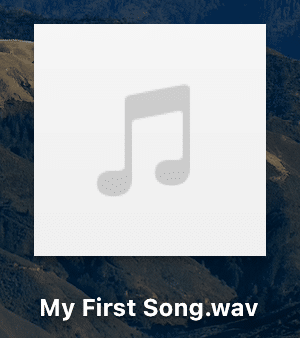
The final step in the initiation stage is to make a vocal, from offset to finish. Don't worry well-nigh how you think a song should be made, whether in that location are any rules or not, simply make something that's ii or more minutes long, and call it done.
This is an essential step. You must get into the habit of finishing music as early on every bit you can.
Otherwise, you lot run the risk of not being able to stop music afterwards on down the track.
You may feel the urge to show everybody your creation. You might feel information technology's time to create a Soundcloud account or mail your track on YouTube. Though there's no intrinsic damage in doing this, I don't recommend it. It's a distraction, especially in the initiation stage.
If you want to speed upwardly the learning procedure and follow a proven framework, check out EDM Foundations . We've had over 3800 beginner producers go through the course with cracking results.
New to music product?
Lookout man our free masterclass on how to acquire electronic music production the smart way (without months of defoliation & frustration)
Stage 2: Exponential Learning
Time: 6-24 months
Stage 2 is where the existent fun begins. You beginning getting the hang of things, and every track you lot make sounds better than the terminal.
This stage takes a while, typically ane-two years. For some people, it may be shorter, especially if they have the freedom to put many hours in. For others, information technology may take longer than two years.
Stage 2 is titled Exponential Learning because that'southward exactly what happens. You lot learn knowledge, develop skills, and improve every bit a producer at exponential speed.
Here'southward an analogy (I know the line is not an exponential bend, but yous get the idea):
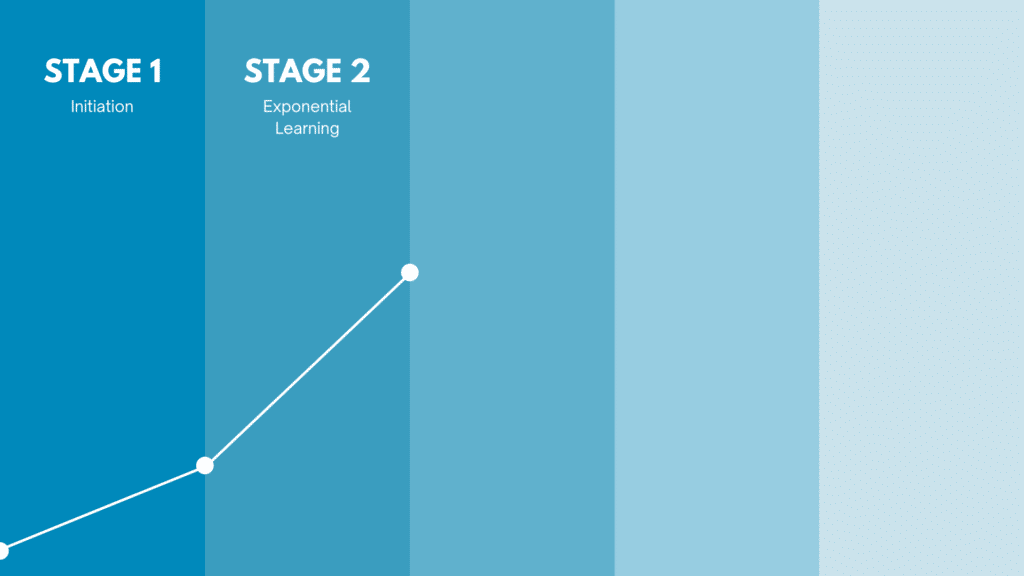
Information technology's an exciting time in your journey as a producer. Your eyes are opened to the limitless freedom that electronic music product presents. Yous listen to tracks you made a few weeks earlier and notice how much you've improved since.
During this stage, at least in the early on months, you'll be improving week on calendar week if y'all put in the time and effort.
But in lodge to excel during this stage, you'll demand to follow these 4 primal disciplines:
Key discipline 1: Learning the fundamentals
In stage 1, you lot probably watched a few tutorials and read some manufactures. You might know a matter or two about music theory, and you might take an idea of what an EQ does.
However, now it's time to knuckle downwardly and gain a basic understanding of a few fundamental concepts, namely:
- Music theory
- Structure & arrangement
- Mixing
I've put these in order of importance starting at the elevation. It'southward important to note that these concepts run deep and wide, and you lot can spend a lifetime learning about mixing and audio alone.
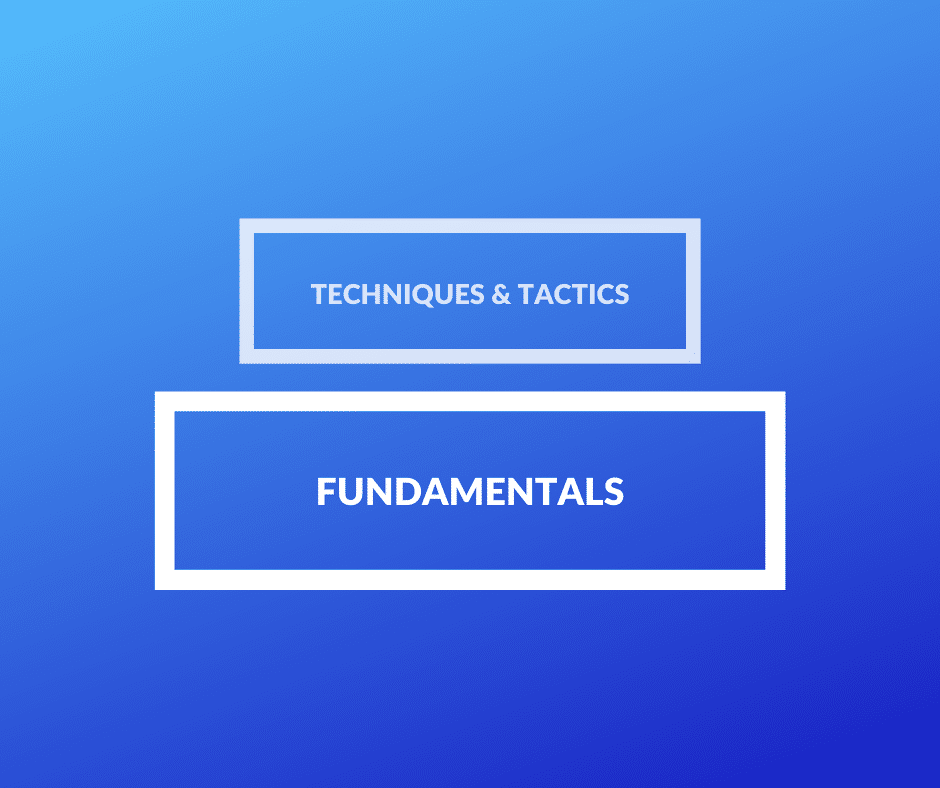
Unless you have a expert reason for going beyond what'southward essential or basic, I highly recommend y'all keep things uncomplicated and relevant. Learning complex jazz music theory probably isn't necessary right now if you're simply wanting to make a few techno tracks.
Music theory
Music theory is absolutely central despite the numerous successful producers who don't know it at all.

Electronic music product differs from traditional music composition and production in many ways, merely it'south nevertheless music that has chords and melodies and, therefore, relies on the same fundamental musical concepts. Not learning music theory earlier is one of my biggest mistakes.
Our course, Songwriting For Producers, is the nigh comprehensive resource for learning theory and songwriting every bit an electronic music producer.
We've also put together a free comprehensive guide to learning music theory (and guess what? It isn't boring to read either).
Download our complimentary music theory guide
Construction & arrangement
One time you've adult a basic understanding of music theory, you'll need to learn structure and organization. Learning structure and organization volition teach yous how to accept a brusk musical idea and aggrandize information technology to create a total-length song.
Fortunately, electronic music follows a predictable and standard construction, and then it'south non difficult to choice upward the basics.
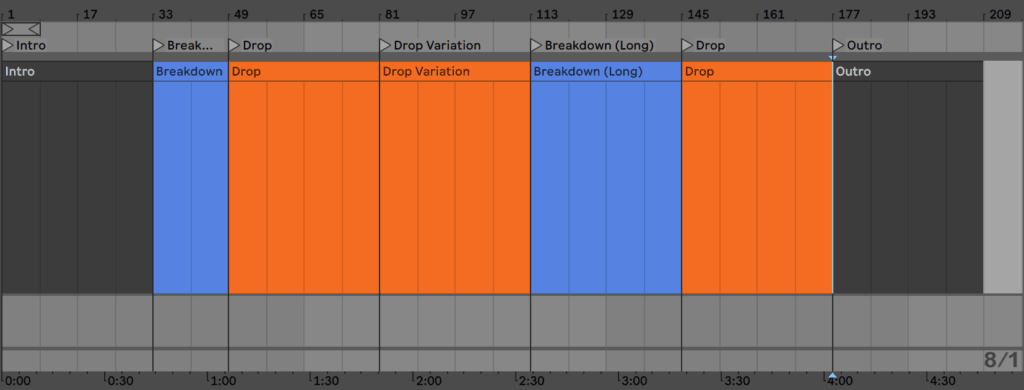
The best style to learn structure and organisation is to drag songs into your DAW and written report them. Pull them apart. Steal the bones construction from an existing track and use information technology for your ain.
Additionally, we recommend investing in EDM Foundations to learn the basics of structure and start applying it quickly.
If you're more than advanced, Songwriting For Producers features 12 genre-specific breakdowns where yous'll learn about how popular songs are structured (and why they work).
Mixing
No i wants to listen to a well-composed and well-arranged vocal that sounds like information technology'southward coming out of a tin can, which is why grasping the fundamentals of mixing is important.
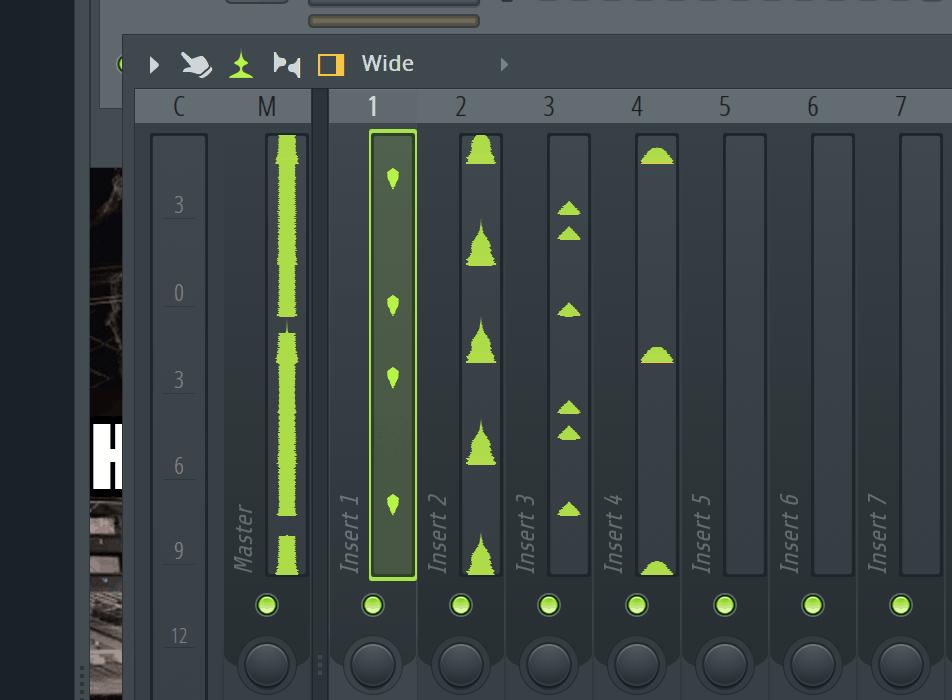
Here's what I recommend to brainstorm with:
- Mixing EDM: The Consummate Beginner'south Guide
- Digital Sound 101: The Basics
- Mixing Secrets for the Small Studio by Mike Senior
If yous get through all these resources, or even just a few of them, you'll have a sufficient level of cognition to practically use to your work. Recall, no corporeality of theoretical learning can replace real exercise, so be wary of the residual between them.
Fundamental discipline 2: Finish fast and finish often
"As Ira Glass and so famously put it, the best way to refine your craft is to create a huge volume of work. Non to create the most perfect slice you can, but to create many pieces of work." – Herbert Lui, Why Quantity Should be Your Priority
I trap that a lot of producers fall into in stage 2 is the perfection or masterpiece trap. They call back that they must create amazing work—that they must focus on creating masterpieces.
Having a perfectionist attitude in stage two is non only an inhibition to learning and progression, information technology as well destroys your self-esteem. Why? Because even if yous were to set the perfect standard for your work and achieve it (which isn't likely), yous're progressing at such rapid speed that y'all'll be disappointed in your "masterpiece" a few weeks afterward.
What yous should focus on instead is finishing. Not just finishing, merely finishing tracks equally often as yous tin.
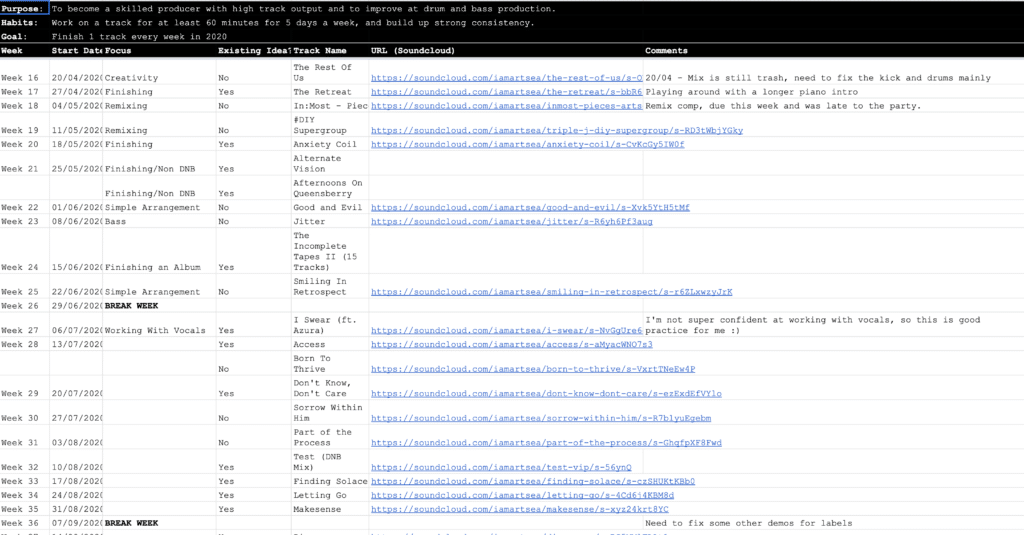
When I was in stage 2, I'd cease tracks in ane day. They didn't sound that great, but I learned something new with each project.
Yous take to focus on quantity during this phase, because if you do, quality will inevitably go up and you'll learn much faster than yous would otherwise.
Key subject three: Diversity & further experimentation
During phase 2, it can exist tempting to pigeonhole yourself into i genre or style of music. This isn't necessarily a bad thing, but I exercise recommend y'all experiment with as many different genres every bit you can.
Why?
Because you'll larn quicker.
I started out making dubstep and picked up some valuable skills such as drum programming and sound design while doing so.
I then ventured over to pulsate & bass and developed my drum programming skills even further.
For a while, I fabricated techno and house, which taught me a lot about the groove. Present, I mostly make trance and progressive house, but the skills I gained from experimenting with other genres notwithstanding come up in handy.
And then, if you lot feel like making genre 10, then practice so. There's no reason why you shouldn't.
Key discipline 4: Gathering feedback and building relationships
At this stage, many producers first thinking about how they should brand and market themselves, how to gain more Soundcloud followers, and so along.
This is nothing more a distraction, and if you're currently stuck in stage 2 then trying to make a name for yourself is a futile effort.
While y'all shouldn't exist spamming forums and the comments section on YouTube videos telling anybody you're the next Martin Garrix, there are certain things worth doing outside of your DAW that volition set you lot upwards for hereafter success and also allow you to learn and progress faster.
The first thing you should be doing – having finished a few tracks – is gathering feedback from people. It's important to become a second set up of ears on your music so you tin larn what your weak points are and if in that location are any ongoing issues with your music (your low-end might be consistently as well loud, for instance).
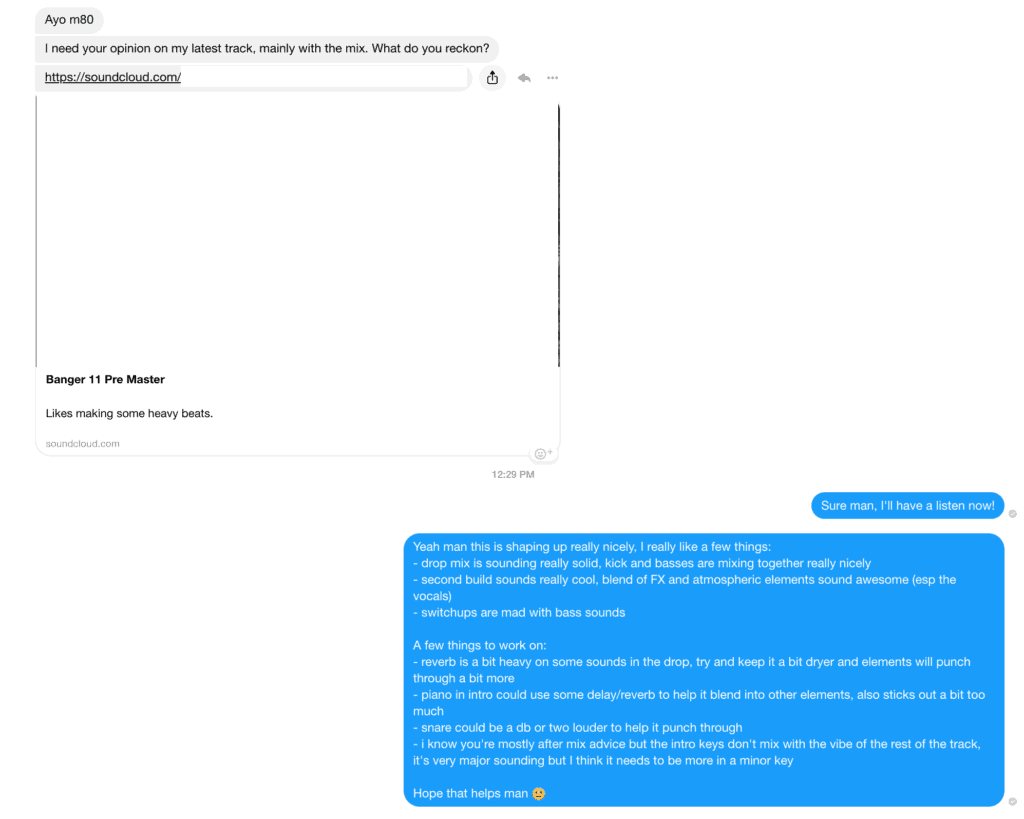
The 2nd thing you lot should exist doing is building relationships with other producers and people in the industry. You should practise this irrespective of whether you desire to build a career in music, mainly because the opportunities that come up from simply knowing people are invaluable.
New to music production?
Spotter our free masterclass on how to learn electronic music production the smart fashion (without months of confusion & frustration)
Stage 3: The Dip
Time: 6-eighteen months
Phase 3 is the well-nigh hard role in an electronic music producer's journey.
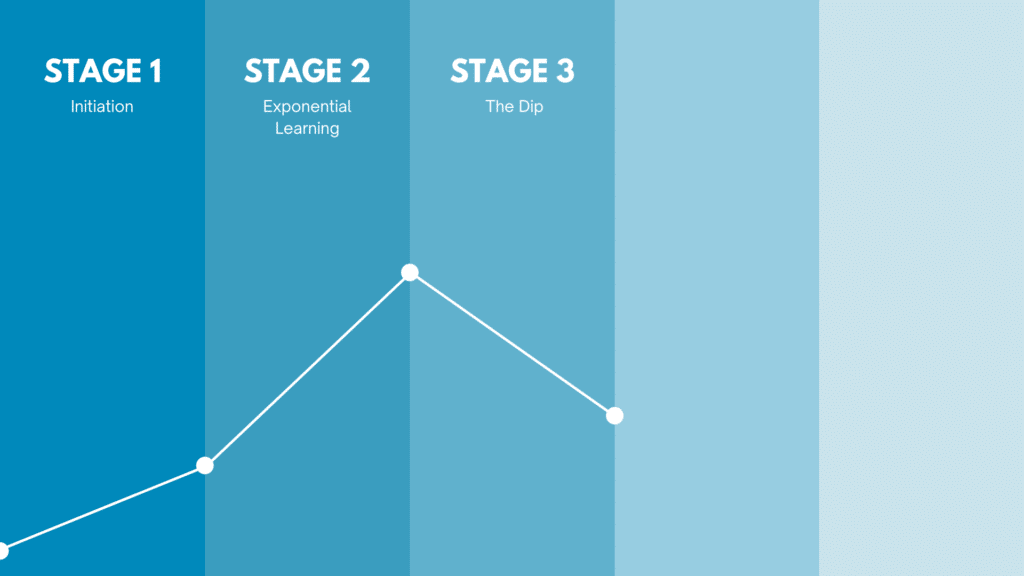
Production starts to become hard and seems more time-consuming. You sit down to piece of work on something and stop up procrastinating—doing something else that'due south easier.
If y'all're lucky, equally in, you're a part of the one%, and then yous may not go through phase iii.
Just you lot probably will get through it. Most people do. In fact, information technology'due south the very reason I wrote The Producer's Guide to Workflow & Creativity.
The unfortunate reality is that most people give up when they reach stage 3.
Fortunately, stage 3 doesn't last forever, and there are ways to progress through information technology faster.
i. Deal with overwhelm
The commencement thing yous must do if you lot find yourself in "the dip" is acquire to deal with the feeling of overwhelm.

Feeling overwhelmed is pretty much guaranteed if y'all're stuck in stage 3. Yous might feel overwhelmed past the fact that yous're not producing every bit much as you lot used to, or simply by the sheer amount of work involved in putting together a decent rails.
Whatever you lot feel overwhelmed past, you need to opposite that feeling and get on top of it. In that location's an age-old productivity technique that will help you lot do this. Information technology'due south called breaking big projects into small tasks.
For example, if y'all're overwhelmed by the sheer corporeality of piece of work involved in putting together a decent track, then break information technology down into modest parts. First, focus on only the melody. Once that's washed, yous can move on to the next matter. This is how you lot bargain with overwhelm.
two. Figure out your objective & motivation
One of the main reasons people requite up during this phase is that they can't observe the passion they once had for making music.
Passion keeps us going. There's no denying that. But at times, it tin be hard to feel it or notice it.
Because of this, it's of import that you figure out two things: your next objective, and your overall motivation or reason for making music.
Your objective might be that you want to release an EP. That'south the next "big affair" on your list, and that's what you're actively working toward. But an objective alone is not plenty, you need an overarching reason or reasons for making music.
My reason for making music is twofold: outset, I brand music considering I love information technology, and 2d, I make music considering information technology helps me teach other people to make it. During times where I feel frustrated with music and don't feel like I "beloved it," I fall back to the second layer and remind myself that in that location's more than than one reason why I make music.
Once y'all have an overarching reason, working through dry periods where y'all lack inspiration and creativity becomes much easier.
Demand aid with this? Bank check out this postal service where I show you how to set up goals equally as producer.
three. Learn how to overcome artistic problems
The third thing you must learn in this stage is how to overcome creative problems. You will encounter them—anybody does.
There's too much material on the topic of creativity and creative block to include in this post, then hither are some links to books and articles on it:
- 74 Creative Strategies for Electronic Music Producers
- Mastery by Robert Greene
- ten Music Product Experiments that will Make Yous More Creative
- How to Destroy Creative Block with the Vocal Palette Strategy
Also, if you want to shout me a few coffees, so my book might be helpful besides.
iv. Be consequent and patient
"The difficult thing is to stick to things when you take outlived the first interest, and non withal got the second which comes with a sort of mastery." – Janet Erskine Stuart
Despite all efforts to overcome creative block and the overwhelming feeling of non getting enough done or non doing your best work, stage 3 is inevitably going to terminal a while.
It's a natural part of an creative person's journey, one that tin can't really be avoided. You take to learn to live with it for a period of time before you come out the other side and enter phase 4.
There'south no magic trick or tip that will brand stage 3 comfy. It's uncomfortable past its very nature—a constant struggle. This means that you have to be consistent and patient.
Consistency matters because, without it, y'all'll never progress through stage 3. Consistency ways edifice habits, and habits assistance y'all push forrad when inspiration is nowhere to be seen.
During stage 3, it'southward a good idea to get into a consistent rhythm, to fix up a schedule.
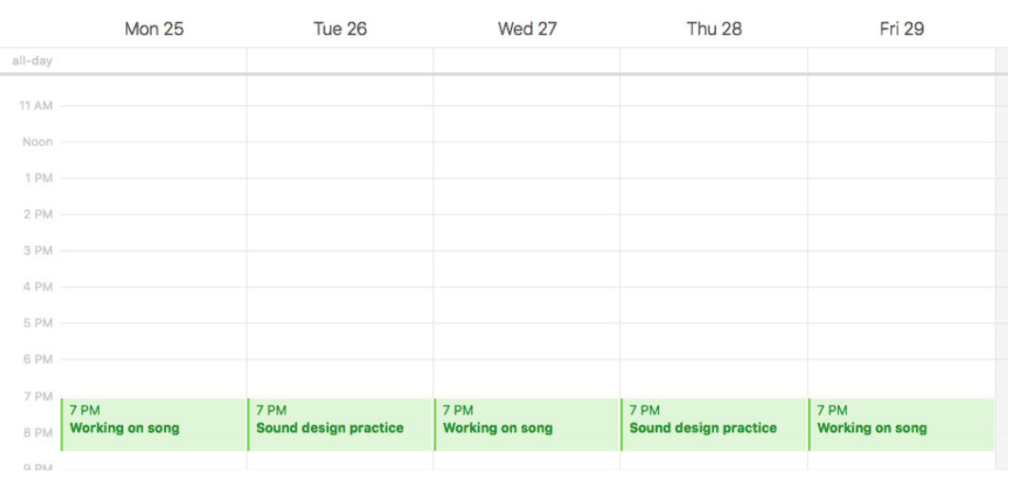
For case, yous might decide to commit to producing for 30 minutes per day no matter what. Showtime small and so you can piece of work upwards to longer sessions (similar xc minutes).
Patience is also important. Yous have to understand that while phase 3 doesn't terminal forever, it's not brusque. Fifty-fifty if you can't run into the calorie-free at the end of the tunnel, you need to firmly believe that it's there and wait. (All the same, don't wait while not doing work. You won't progress through phase three without putting in effort).
This is all part of developing an artist's mindset, a mindset that keeps you driven and focus towards reaching your production goals.
New to music product?
Sentinel our free masterclass on how to learn electronic music production the smart mode (without months of confusion & frustration)
Stage 4: Proficiency
Time: 2-5 years
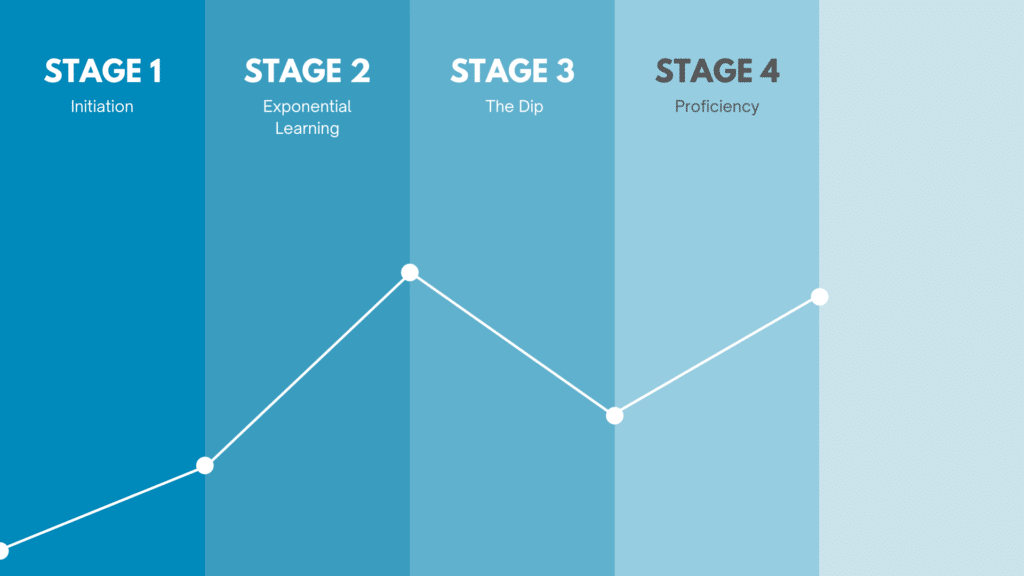
It's difficult to pinpoint exactly where phase 3 ends and phase 4 starts, mostly considering there's a fair amount of overlap.
Simply you'll know when you're out of the rough. Stage 4 is the final stage before mastery, which means that while yous should however be actively learning and progressing, your work is starting to hold upward in terms of quality.
Now, phase 4 typically takes years. Information technology's important to understand that I'm talking virtually the time information technology takes to go from being proficient to a master of the craft. Nearly people admit that it takes approximately 10 years to become a principal in whatever field, with the definition of a main being "world class."
Then, while I've noted that stage 4 takes 2-v years to progress through, that does not mean it takes 2-5 years to get a practiced or even great producer. You can easily build a career at stage four.
Primal discipline ane: Advanced learning and remaking
By this stage, you should accept a deep agreement of fundamental concepts and a "big picture" view of how different concepts and disciplines interact with each other.
But information technology's fourth dimension to become fifty-fifty deeper. At this indicate, yous're starting to further your strengths and bring up your weaknesses. Learning complex jazz music theory now is far more appropriate than in stage two.
Advanced learning is all about going deep into topics. It helps to start with your stiff points, considering, at the cease of the day, music product is too various a field to become a principal in everything.
If yous're into sound design, you might delve into the physics side of it, learning why sure waveforms sound the mode they do. If yous dearest mixing, you lot might decide to intern at a studio or read some textbooks on audio. You get the idea.
Remaking
There comes a point where you lot've learned most of what's necessary from books and videos, and you need to become across the "general" advice and gather more nuanced ideas and tricks.
The all-time way to do this is to learn from other artists who are at or above your skill level. Given that anybody is unique and has unique thoughts, it follows that their music volition be unique in i fashion or some other.
How do you learn from other artists? You lot written report their music. Better withal, you remake it. Remaking forces you to listen intently. It forces you to try out new ideas and solve bug. It forces you to think virtually what you're hearing and how it's made.
Central bailiwick 2: Collaboration
Another thing that's beneficial to focus on during this stage is collaboration. This could be working with another producer, vocaliser or musician. There are many reasons why collaboration helps:
- You selection up tricks and tips from other artists and producers
- Yous learn to piece of work well with other people and communicate ideas
- Yous learn how to make compromises
- You build relationships with agreeing people
- You build your brand by leveraging other'southward audiences/fanbases
There'south actually no excuse for not collaborating. If you live in an area where no one makes music, you can either interact with someone over the internet or motility.
If yous don't know anyone on the cyberspace who makes music, stop being lazy and bring together the EDMProd Artist Customs, post a question asking if anyone wants to collaborate with yous, and get busy.
Primal discipline 3: Career paths
I've tagged this as optional because I know not everyone wants to build a career in music production. You might honey your day job and only want to make music on the side.
But I'thousand willing to bet virtually of yous reading this would like to build a career out of music if you could. Despite what people say, there are actually many dissimilar career paths available for the skilled music producer. You lot could:
- Build a career as an artist
- Exercise freelance work
- Sound editing
- Sound design
- Ghost production
- Become into film and commercial work
- Teach music production
- Create sample packs and other products
Obviously, there are many more than jobs than just those, just that should requite you an idea. Headlining at Ultra is not the only career path.
The other affair that must be noted is that about people who accomplish mastery practise then because they piece of work full time on their craft. If we employ the 10,000-60 minutes rule as a starting point (and I don't care whether it's scientific or non, it's a good rule of thumb), then over 10 years, you'd demand to put in 3 hours a day.
Putting in three hours per day while property a 9-5 job is non easy. Yous can reach stage 5 producing music "on the side," but information technology's certainly not like shooting fish in a barrel.
If yous want to see some job offers in the music industry? Caput to musiccareers.co.
New to music production?
Watch our gratuitous masterclass on how to learn electronic music production the smart fashion (without months of defoliation & frustration)
Phase v: Mastery
Fourth dimension: Forever!
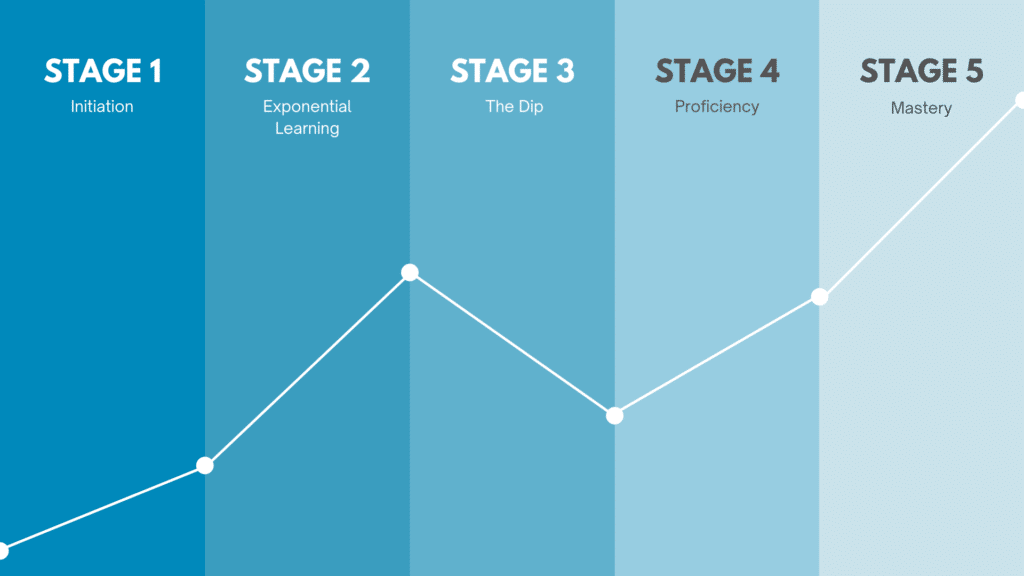
The concluding phase is one that very few people become to.
Mastery, as commonly divers, is when you lot've practised your craft for and so long that information technology becomes most a completely subconscious human activity. You produce music effortlessly.
In my heed, some "masters" of electronic music production would exist people like BT, Above & Beyond, Mat Zo, Koan Sound, and so forth.
Please notation that I'm not in this phase, so annihilation I recommend hither is purely from a point of ascertainment and what I call back should be done during this stage.
one. Deep experimentation
When you've mastered your craft and everything you make is quality, it's time to innovate.
Deep experimentation is about throwing preconceived notions and "the standard manner of doing things" out the window. As a master, you first to question underlying assumptions you have about production processes.
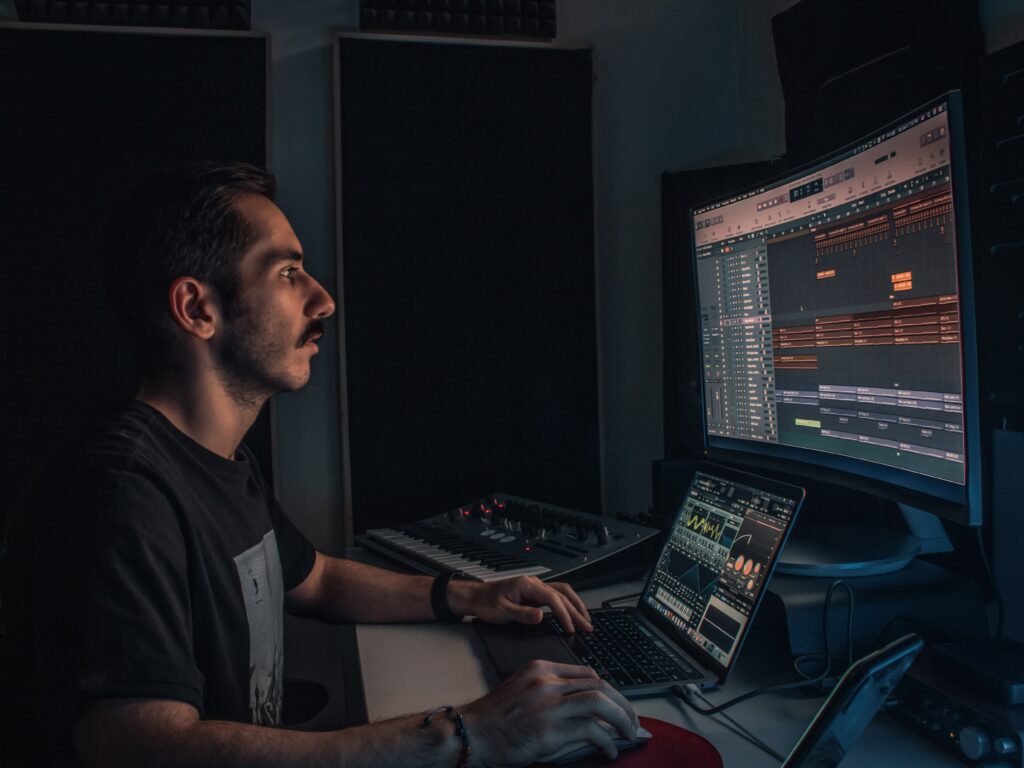
"Is this really the best way to practice things? What if I did it this way?"
The principal can afford to experiment in such a way and get abroad with it considering he understands the rules so well and he knows what will likely happen if he breaks them.
The intersection of diverse facets that music production features is and so clear to the master, which is why the experiments he comes up with are far more likely to succeed compared to the proficient producer or phase 2 producer.
Oftentimes, this will pb to breakthroughs. Perhaps information technology'due south a new mixing technique or method of composition. Perchance it's a new class of song construction. Music is ever-evolving, and masters are the ones who push it frontward the most.
two. Branching out
Having reached the point of mastery, you might start to wait for new challenges in related fields to music production.
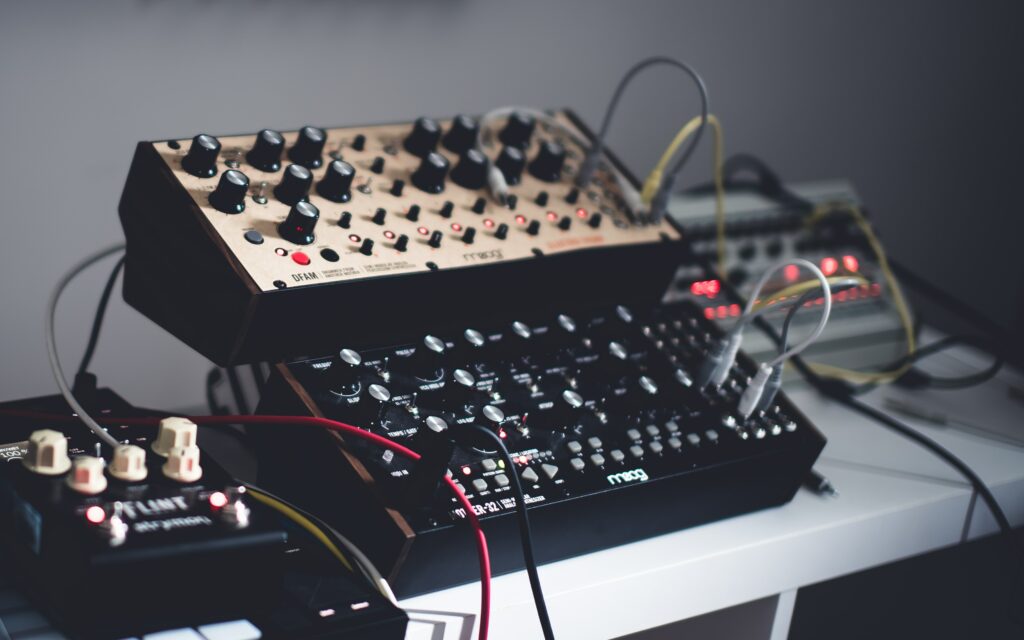
For example, you might determine to rigorously written report acoustics or classical music, both of which will have bearing on your abilities as a producer.
You co-operative out into different fields non just because they aid y'all as a producer, simply considering of pure interest.
3. Becoming a leader
Finally, as a master, you'll probably become a leader unless you lot're a recluse. Maybe y'all pioneer something, perhaps you develop a new genre that becomes pop. Who knows?
I mean, this is substantially what Skrillex did, correct? That'southward how he's able to give out confident advice like below:
What's certain is that stage 5, the mastery stage, does not end. There is no stage 6, there is simply mastery and that'south it.
Even the master has to keep learning.
What now?
Chances are, you're reading this as someone who's completely new to music product or needs some guidance.
If so, I know exactly how y'all feel. Even later on reading this article, you're probably however feeling overwhelmed, confused, and lost.
Fortunately, that can change.
Ane option is to come up up with a systematic plan for how you're going to acquire production. You lot can use this article every bit a guide, develop your own strategy, find the right resources (I've linked a bunch of skilful ones), and read some solid books.
That's a good pick. I wish I'd taken it when I started out (I wasted years floundering effectually, watching random YouTube tutorials, and not really learning annihilation).
The other option is to follow a framework that'southward enabled thousands of other producers to move from confused, beginner producer to confident intermediate producer.
A framework that drives yous to have action and gives you the tools you need to make your first song, then your second, then your third, then on.
A framework that doesn't just teach you a bunch of theory, but actually shows yous how to make music on a practical, fun level.
To learn more than about this framework, bank check out my free video grooming past clicking the push below.
New to music production?
Watch our complimentary masterclass on how to acquire electronic music product the smart way (without months of confusion & frustration)
How Long Does Fl Studio Take To Learn,
Source: https://www.edmprod.com/5-stages-electronic-music-producer/
Posted by: hartmanfesion.blogspot.com


0 Response to "How Long Does Fl Studio Take To Learn"
Post a Comment